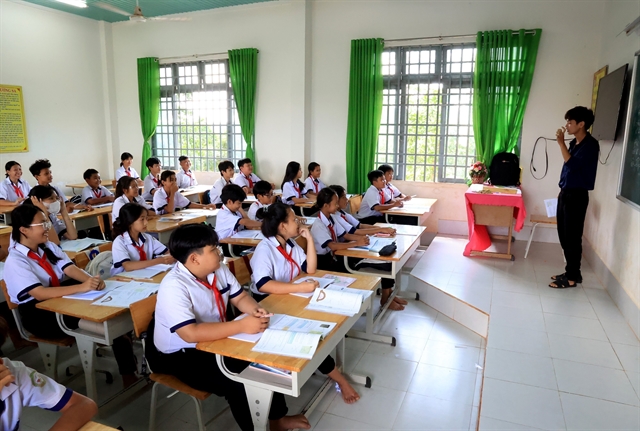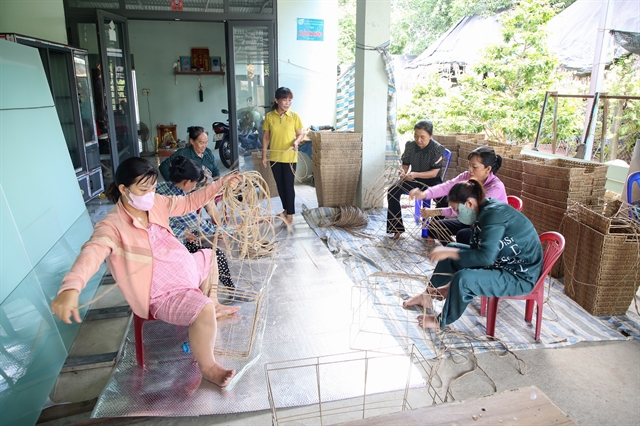 |
| A classroom in Tân Hoà Secondary School in Tây Ninh Province’s Tân Châu District. –—VNA/VNS Photo Hồng Đạt |
TÂY NINH — Tây Ninh Province has increased investment in education and vocational training, improved their quality, strengthened its labour force, and created stable livelihoods for workers.
The southeastern province has been building infrastructure for schools at all levels to improve their quality.
It has 151 state-owned schools from pre-school to senior high levels recognised as meeting national standards, or 36 per cent of all its public schools, according to its Department of Education and Training.
In the 2023-24 academic year alone 20 schools were recognised as meeting national standards.
During this school year schools from pre-school to senior high school have successfully implemented their tasks and proactively developed teaching plans suited to their locality, students and individual needs, the department reported.
All localities have effectively provided compulsory primary education, with up to 98.8 per cent of senior high school students graduating last year.
Its sole ethnic minority boarding school has educated hundreds of students from 13 ethnic groups since opening in 2012.
Vocational Training
Tây Ninh had a population of nearly 1.2 million, including 680,600 people of working age (15 years and above) last year.
Of this number, 669,765 people are employed in various sectors.
The number of working-age individuals with vocational qualifications is expected to rise to 210,000 in 2025 from 187,534 last year.
The province has 17 state-owned and private vocational institutions, including a college, intermediate schools, vocational training and continuing education centres, driving centres, and a company.
The state-owned Tây Ninh Vocational College and Tây Ninh Economics - Technology Intermediate School train around 1,500 students annually.
The province is implementing a project to develop vocational training that will run up to 2030.
To cost more than VNĐ190 billion (US$7.7 million), it is funded by public and private sources.
It aims to take the rate of workers with vocational skills to 80 per cent by 2030, with 35 per cent holding certificates.
It also targets having at least 45 per cent of secondary school graduates pursue basic- and intermediate-level vocational education and 50 per cent of senior high school graduates opting for college-level vocational education.
The province is seeking funds from the Government to upgrade its vocational schools to meet the needs of the job market.
It is also soliciting private investment to build an intermediate vocational school in Phước Đông Industrial Park in Gò Dầu District and a vocational college in Dương Minh Châu District.
Priority is being given to developing vocations that support the construction of new rural areas this year.
The vocations include agriculture, seafood, forestry, handicrafts, pottery, and the production of wooden and bamboo products.
They also involve producing raw materials for manufacturing products, textile and garment and salt production, breeding ornamental fish and plants, and services.
The province has 400 households and one co-operative engaged in traditional crafts such as making leaf hats, aluminum and wooden products, incense, bamboo items, and rice paper.
Support policies will be put in place to develop traditional crafts and preserve traditional craft villages.
This year the province aims to provide 1,160 rural workers with agricultural vocational skills and 1,380 others with non-agricultural skills.
It aims to increase the employment rate of skilled workers to at least 80 per cent this year.
Traditional crafts have enabled many rural workers to ensure a steady livelihood and escape poverty, according to local authorities.
 |
| Lê Thị Kim Thuý’s handicraft-making establishment in the border commune of Thành Long in Tây Ninh Province’s Châu Thành District has created jobs for nearly 100 local women. — VNA/VNS Photo Giang Phương |
Lê Thị Kim Thuý, a 52-year-old woman from Thành Long Commune in Châu Thành District, started a business that makes plastic weaving products, providing jobs to nearly 100 local women after completing a handicrafts course in 2020.
The commune Women’s Union helped her enrol in the course.
In her area, it is difficult for older people to find suitable jobs they could do in their spare time, she said.
She had earlier struggled to find work herself, and so when she began earning a steady income from her start-up, she taught other local women how to make plastic weaving products, she said.
“Depending on their skills, thee can earn VNĐ80,000 – 100,000 ($3-4) a day.”
Trịnh Thị Thoa, chairwoman of the Thành Long Commune Women’s Union, said most women in the area buy and sell goods or work as daily labourers, and so lack a steady income.
Thuý’s start-up model has helped women utilise their free time to increase their incomes, she added. — VNS
























